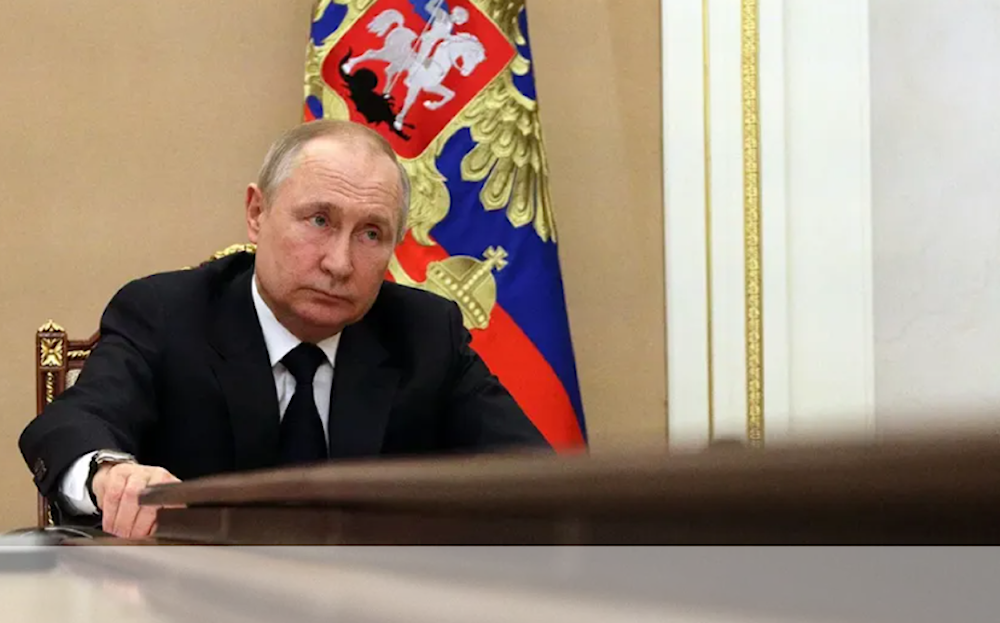Putin to Scholz: Any deal on Ukraine should consider Russia security
This marks the first call between the Russian and German presidents since 2022 and comes at a pivotal moment for the future of Western support for Kiev.
-

Russian President Vladimir Putin chairs a meeting with members of the Russian government via teleconference in Moscow on March 10, 2022. (AFP)
Russian President Vladimir Putin told German Chancellor Olaf Scholz that any deals on Ukraine should consider Russian security interests, develop from new geographical realities, and address the core causes of the conflict, a statement by the Kremlin revealed.
German sources confirmed that German Chancellor Olaf Scholz and Russian President Vladimir Putin spoke by phone on Friday for the first time in over two years for "an hour," discussing the Ukraine war, the Middle East, and energy issues.
Putin has not talked with most NATO and Western leaders since 2022 when the EU and US slapped heavy sanctions on Russia for the war in Ukraine, yet he maintains contact with Hungarian Prime Minister Viktor Orban, who is skeptical of Western policy toward Russia, and Turkish President Recep Tayyip Erdogan.
A Kremlin statement revealed that the call was held "on the initiative of the German side," asserting that the aides of Putin and Scholz will be in touch.
During the call, Putin stressed that Russia has never rejected and is still willing to resume talks on Ukraine.
"The Russian side has never refused and remains open to resuming the negotiations that were interrupted by the Kiev regime. Russia's proposals are well known and were outlined, in particular, in a speech at the Russian Foreign Ministry in June," a Kremlin statement explained.
Meanwhile, a German government spokesperson said in a written statement, “The Chancellor urged Russia to be prepared to negotiate with Ukraine with the aim of achieving a just and lasting peace."
Ukraine war direct result of aggressive NATO policy: Putin
According to Scholz's spokesperson Steffen Hebestreit, the Chancellor condemned the war in Ukraine and urged Putin to withdraw his troops during the call.
Putin responded by telling Scholz that the war was a direct result of NATO's aggressive policy of establishing an anti-Russian foothold in Ukraine and that the unprecedented deterioration in relations between Russia and Germany was the result of German authorities' unfriendly behavior.
Regarding the Middle East, the Kremlin's statement detailed how the Russian President highlighted Russian efforts to "de-escalate and find peaceful solutions to the crisis in the region."
Scholz, on his part, stated that Russia must be willing to negotiate with Ukraine for "lasting peace" and stressed Germany's unwavering support for Ukraine "for as long as necessary," emphasizing to Putin that he ought not to bet on time for Europe's support to wane, according to the spokesperson.
Before calling Putin, Scholz spoke with Ukrainian President Volodymyr Zelensky and "will do so again after the conversation with the Russian President," the chancellor's spokesperson said in a statement.
Putin reminded Scholz on Friday that Russia has always clearly met its energy duties and is willing to collaborate if Germany expresses a desire. "It was emphasized that Russia has always clearly fulfilled its contractual and contractual obligations in the energy sector and is ready for mutually beneficial cooperation, if the German side shows interest in this," according to the Kremlin statement.
Europe seeks last-minute Ukraine support from Biden: Bloomberg
Europe has made a final appeal to the outgoing Biden administration to boost US support for Ukraine to strengthen Kiev's position as much as possible before the presidential term ends in January.
According to Bloomberg, European leaders and officials have asked the US to provide more weapons and artillery to Ukraine, impose additional sanctions on key Russian sources of income, and target Moscow's ability to acquire banned technologies used in weapons, according to people familiar with the matter. The sources noted that many of the European requests were informal in nature.
The resources mentioned — money, ammunition, and weapons — mainly come from a $61 billion package approved by the US Congress earlier this year.
Despite the dwindling time for Biden to act on the requests, the US is already working to adopt new sanctions against Russia's oil fleet and the DPRK by the end of November, according to anonymous sources.
Many EU leaders are also pushing the US to allow Ukraine to use Western weapons to strike military targets inside Russia despite pushback from German Chancellor Olaf Scholz and Biden, who believe the escalation is not worth the risk.

 4 Min Read
4 Min Read









